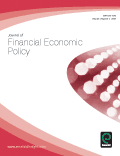
Journal of Financial Economic Policy
Scope & Guideline
Exploring the dynamics of financial frameworks and economic strategies.
Introduction
Aims and Scopes
- Financial Inclusion and Economic Development:
The journal focuses on the intersection of financial inclusion and economic growth, examining how access to financial services impacts entrepreneurship, household consumption, and overall economic performance, particularly in developing countries. - Impact of Economic Policy Uncertainty:
Research on the effects of economic policy uncertainty on financial markets, firm behavior, and macroeconomic stability is a key theme, exploring how uncertainties influence investment decisions and market dynamics. - Global Financial Markets Interconnectivity:
The journal investigates the interconnectedness of global financial markets, particularly how events in one market can affect others, including the analysis of volatility spillovers and market integration. - Macroeconomic Policy and Financial Stability:
There is a consistent emphasis on the relationship between macroeconomic policies, such as monetary and fiscal policies, and financial stability, with studies examining the implications for banking systems and financial institutions. - Sustainable Finance and Environmental Impacts:
The journal also addresses sustainability in finance, including the role of green finance, climate risk disclosures, and the impact of environmental factors on financial markets. - Technological Innovations in Finance:
Research on the effects of financial technology (FinTech) innovations, digital currencies, and their implications for traditional banking and financial services forms a significant part of the journal's scope.
Trending and Emerging
- Climate Finance and Sustainability:
There is an increasing focus on the intersection of finance and environmental sustainability, particularly regarding mandatory climate disclosures and the impact of climate change on financial markets. - Financial Inclusion in Emerging Markets:
Recent publications emphasize the importance of financial inclusion, particularly in developing countries, exploring its effects on economic growth and the role of non-financial services in enhancing access to finance. - Global Economic Policy Uncertainty:
A growing number of studies are examining the impacts of global economic policy uncertainty on financial markets, highlighting its relevance in today’s interconnected financial landscape. - Digital Finance and Innovation:
Emerging technologies in finance, including blockchain and cryptocurrencies, are becoming prominent topics, as researchers explore their implications for financial systems and market dynamics. - Connectedness of Financial Markets:
Research on the connectedness and interdependencies among various financial markets is trending, particularly in the context of global crises like the COVID-19 pandemic and geopolitical tensions. - Macroeconomic Factors and Financial Stability:
There is a rising trend in analyzing how macroeconomic factors influence financial stability, with a focus on the implications of monetary policy and regulatory frameworks in different regions.
Declining or Waning
- Conventional Banking Practices:
There has been a noticeable decline in papers focusing solely on traditional banking practices, as the journal increasingly emphasizes the role of FinTech and alternative financial services. - Impact of Political Risk on Financial Markets:
Although political risk has been a significant area of study, recent titles suggest a waning interest as the focus shifts towards more quantifiable financial metrics and less on the qualitative aspects of political influences. - Historical Financial Crises Analysis:
Research that centers on historical financial crises appears to be decreasing, with fewer studies exploring past crises in depth, possibly due to a shift towards analyzing current and emerging financial issues.
Similar Journals
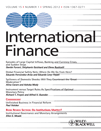
International Finance
Advancing global financial insights.International Finance is a prestigious academic journal published by WILEY, dedicated to the exploration and advancement of theories and practices in the realms of finance, development, and geography. With a strong emphasis on empirical and theoretical research, this journal provides a crucial platform for researchers, professionals, and students to disseminate cutting-edge findings that shape our understanding of the financial landscape on a global scale. Holding an impressive impact factor and categorized in the Q2 quartile across multiple disciplines, including Development, Finance, and Geography, the journal has established itself as a significant contributor to scholarly discourse. Since its inception in 1998 and spanning until 2024, International Finance offers a comprehensive overview of current trends and challenges faced in financial contexts, enhancing the decision-making processes within academia and industry alike. Although the journal is not open access, its rigorous peer-review process guarantees high-quality content that is indispensable for anyone engaged in the diverse fields intersecting with finance.
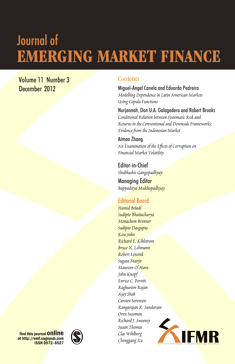
Journal of Emerging Market Finance
Empowering Scholars with Impactful Financial ResearchThe Journal of Emerging Market Finance, published by SAGE Publications India Pvt Ltd, is a premier academic journal that serves as a vital resource for researchers, professionals, and students in the fields of finance and economics. Established in 2002, this journal focuses on the multifaceted dynamics of emerging market economies and their financial systems. With an ISSN of 0972-6527 and an E-ISSN of 0973-0710, it has garnered attention with its respectable Q3 rankings in both the Economics and Econometrics and Finance categories, reflecting its commitment to high-quality research. Despite its limited open-access options, the journal remains a significant platform for scholarly discussions, providing insights on emerging financial instruments, market behaviors, and economic policies in developing economies. As a continuously evolving publication, it aims to bridge the gap between theory and practice, promoting an understanding of the complexities faced in these vibrant markets, ultimately serving the academic community with relevant and impactful research until 2024 and beyond.

International Journal of Financial Studies
Championing accessible research in the world of finance.The International Journal of Financial Studies is a premier publication dedicated to advancing the field of finance through open-access research. Published by MDPI based in Switzerland, this journal offers researchers, professionals, and students a platform to disseminate their findings in an accessible format since its establishment in 2013. With its ISSN of 2227-7072 and a commendable impact reflected in its Q2 ranking in finance, it occupies an influential position among finance-related journals, as evidenced by its 65th percentile rank in Scopus. The journal encompasses a wide array of topics in finance, making it essential reading for those seeking to stay abreast of current research trends and methodologies. As an open-access journal, all articles are freely available, significantly enhancing the visibility and reach of published studies, which is crucial for fostering collaboration and innovation within the global financial community. Published continuously until 2024, the International Journal of Financial Studies is not just a source of knowledge; it is a critical contributor to the progression of financial scholarship.
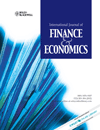
INTERNATIONAL JOURNAL OF FINANCE & ECONOMICS
Unveiling Insights for Financial ExcellenceInternational Journal of Finance & Economics, published by Wiley, is a premier academic journal that serves as a vital resource for researchers and professionals in the fields of finance, accounting, and economics. With an impressive impact factor and a reputation for excellence, the journal is recognized in the 2023 Scopus rankings, placing in the top quartiles across multiple categories, including Q2 in Accounting, Economics, and Finance. The journal has been a significant contributor to academic discourse since its inception in 1996, with its converged years extending to 2024, thereby ensuring the continuous advancement of knowledge in these critical areas. Although it operates under a traditional subscription model, its comprehensive articles provide insightful analyses, empirical research, and theoretical advancements that cater to a diverse audience—from seasoned scholars to emerging students in the field.

FINANCE A UVER-CZECH JOURNAL OF ECONOMICS AND FINANCE
Bridging Theory and Application in Finance ResearchFinance: A Uver-Czech Journal of Economics and Finance is a distinguished academic platform published by Charles University in Prague, focusing on the multifaceted domains of economics and finance. Established in 1996, this journal aims to foster scholarly discourse by publishing high-quality research articles that address contemporary finance issues, economic theories, and their practical applications. With an ISSN of 0015-1920, the journal currently holds a Q4 category ranking in Accounting, Economics, and Finance, making it a vital resource for researchers, professionals, and students who seek to navigate the complexities of these fields. Although it does not offer open access, its contributions nevertheless enrich the academic community, endorsing critical analyses and innovative methodologies. Located in the heart of the Czech Republic, Finance is committed to exploring the intersections of finance and economics, thereby playing an essential role in the development of knowledge within the global scientific discourse.
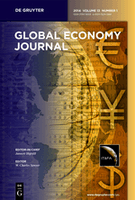
Global Economy Journal
Advancing economic understanding on a global scale.Global Economy Journal, published by World Scientific Publishing Co Pte Ltd, is an authoritative platform dedicated to advancing research in the fields of economics, econometrics, and finance. Established in 2006 and operating from Singapore, this journal aspires to address comprehensive topics that shape both global and local economic landscapes, making significant contributions to academic discourse and policy-making. With an ISSN of 2194-5659 and an E-ISSN of 1553-5304, the journal is recognized for its rigorous peer-review process and is currently ranked in the Q3 quartile of economics journals as of 2023, placing it within the top half of scholarly publications in the field. The Scopus ranking positions it at #132 out of 288, showcasing its growing influence among researchers and professionals alike, embodying a percentile of 54. Although it does not offer open access, the journal plays a pivotal role in disseminating cutting-edge research, fostering a profound understanding of economic trends, challenges, and innovations that impact societies worldwide. Researchers, professionals, and students are encouraged to engage with the latest findings and discussions published in the Global Economy Journal to stay at the forefront of economic thought and practice.

Asian Academy of Management Journal of Accounting and Finance
Advancing Knowledge in Accounting and FinanceThe Asian Academy of Management Journal of Accounting and Finance, published by PENERBIT UNIVERSITI SAINS MALAYSIA, is a pivotal open-access platform that has been disseminating valuable insights in the field of accounting and finance since its inception in 2006. With an emphasis on the unique economic landscape of Asia, this journal provides a forum for researchers and practitioners to contribute innovative research and critical analyses. Hailing from Malaysia, it boasts an E-ISSN of 2180-4192 and continues to be a significant resource for academics, professionals, and students alike. Regularly updated and accessible since 2012, the journal offers an increasing repository of knowledge, as indicated by its Scopus rankings in both the Finance and Accounting segments, with respective ranks of 197/317 and 121/176. Despite its recent Q4 and Q3 quartile standings for 2023, the journal demonstrates a commitment to elevate research quality and influence within the respective disciplines. For those interested in expanding their understanding of contemporary issues in accounting and finance, the Asian Academy of Management Journal stands as an essential scholarly resource.
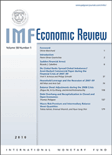
IMF Economic Review
Unveiling the Dynamics of Global Economic DiscourseIMF Economic Review, published by Palgrave Macmillan Ltd, stands as a preeminent journal in the fields of Economics and Business Management, holding a prestigious Q1 ranking in both categories as of 2023. With an ISSN of 2041-4161 and an E-ISSN of 2041-417X, this journal not only showcases high-quality, peer-reviewed research but also embraces the principles of Open Access, promoting wide dissemination of its findings to researchers, professionals, and students alike. Spanning significant years from 2010 to 2024, the IMF Economic Review features innovative analyses and insights that challenge conventional economic paradigms and foster deeper understanding of global economic dynamics. Its impressive Scopus ranking places it in the top 10% of economics journals globally, affirming its vital role in advancing academic discourse and practical application in economics and finance. For those dedicated to exploring the intricacies of economic theory and practice, the IMF Economic Review is an invaluable resource that not only informs but also inspires.
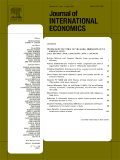
JOURNAL OF INTERNATIONAL ECONOMICS
Advancing global economic insights.JOURNAL OF INTERNATIONAL ECONOMICS, published by ELSEVIER, stands at the forefront of advancing knowledge in the fields of economics and finance. With an esteemed Q1 ranking in both Economics and Econometrics and Finance categories, this journal has established itself as a premier platform for disseminating innovative research. Since its inception in 1971, the journal has provided critical insights into the dynamics of international economic interactions, making it essential reading for researchers, professionals, and students seeking to understand complex global economic issues. With access to high-quality, peer-reviewed articles, readers can stay abreast of the latest trends, methodologies, and empirical findings shaping the economic landscape. Based in the Netherlands, the journal continues to attract contributions from leading experts worldwide, with its rigorous selection process ensuring that only the most impactful research is published, further enhancing its significance in the academic community.

American Economic Journal-Macroeconomics
Shaping Economic Thought Through Rigorous ResearchAmerican Economic Journal-Macroeconomics, published by the American Economic Association, stands at the forefront of economic research, addressing pivotal macroeconomic issues that shape global economies. With an impressive Scopus rank of #8 out of 288 in its field and a notable 97th percentile ranking, this journal is widely regarded as a top-tier publication, specifically categorized in the Q1 category for Economics, Econometrics, and Finance as of 2023. Operating under ISSN 1945-7707 and E-ISSN 1945-7715, it aims to disseminate high-quality research from 2009 through 2024 and beyond, providing crucial insights into macroeconomic theory and policy. Although the journal currently does not operate under an open access model, it remains a vital resource for researchers, economists, and students seeking to deepen their understanding of macroeconomic dynamics and their implications for economic policy worldwide. The journal's impactful contributions make it an essential read for those striving to influence economic thought and practice.